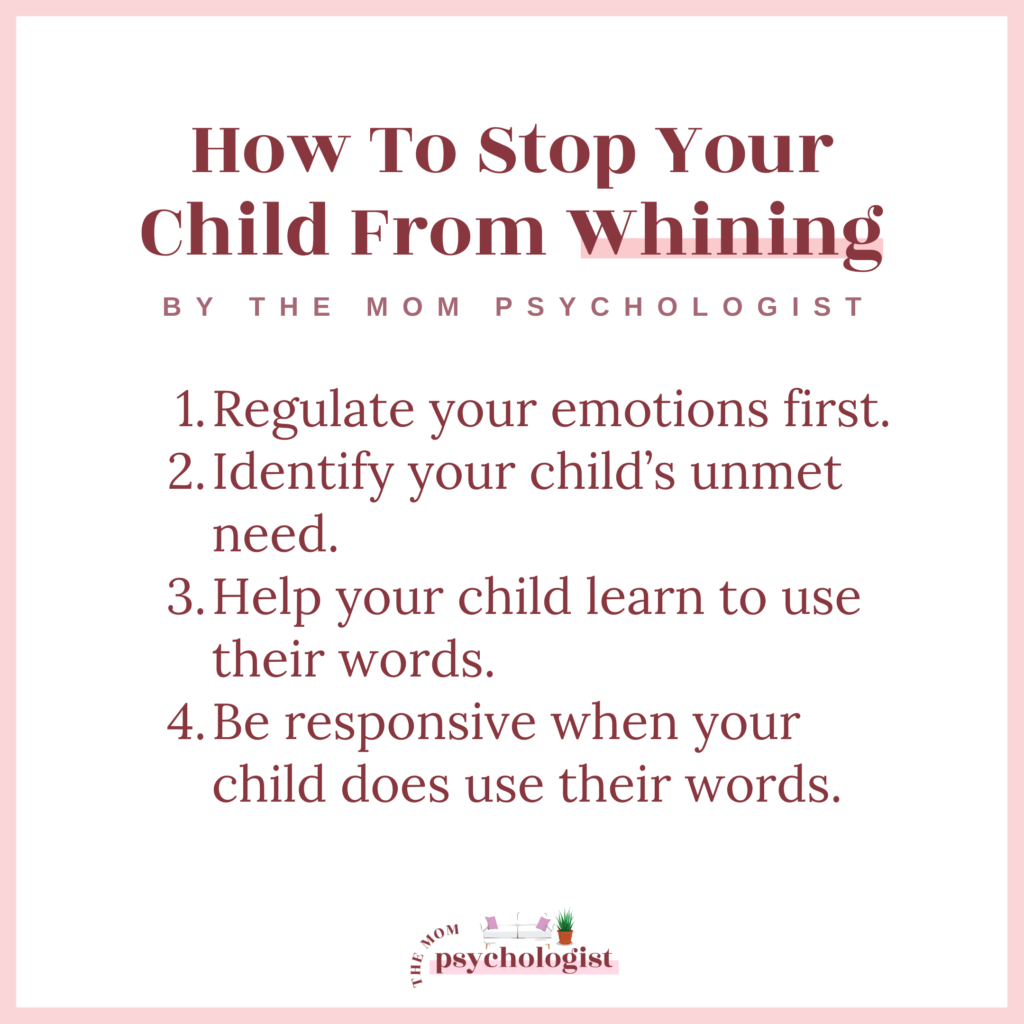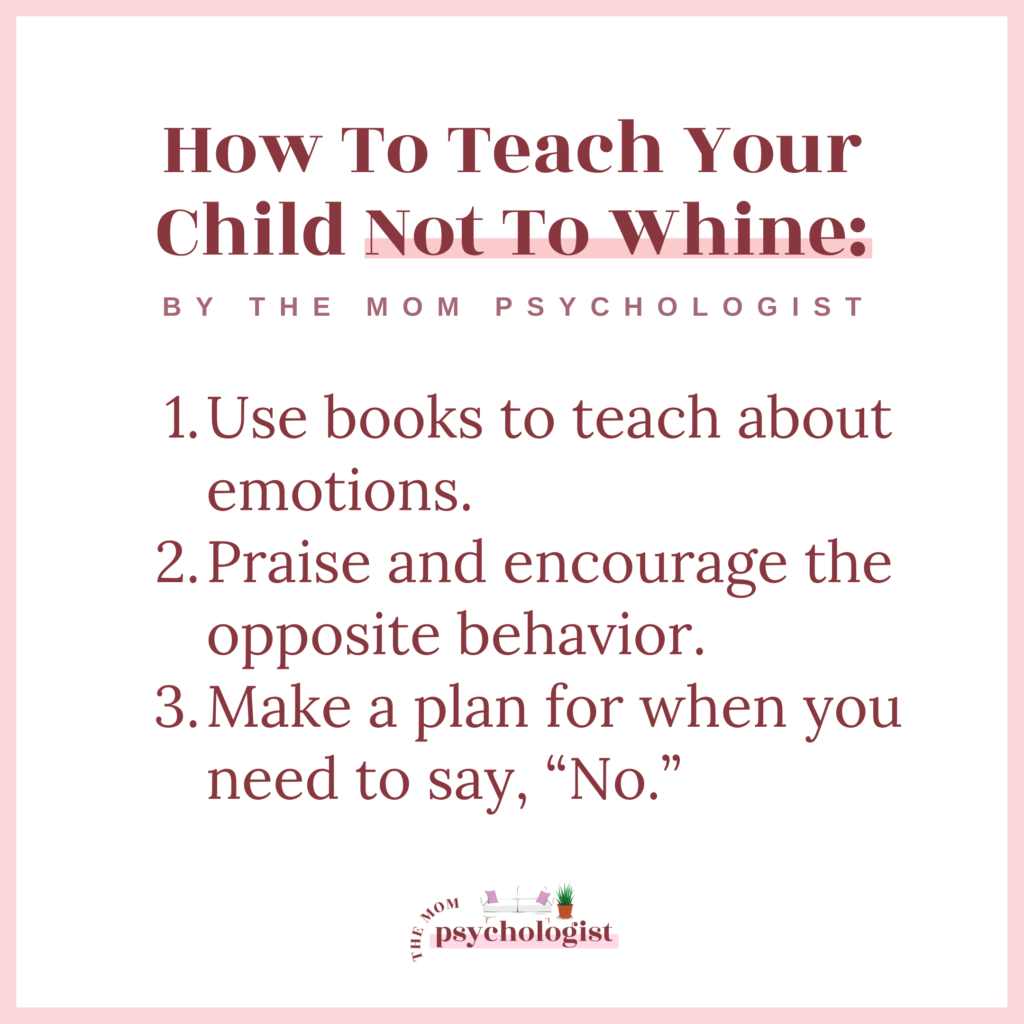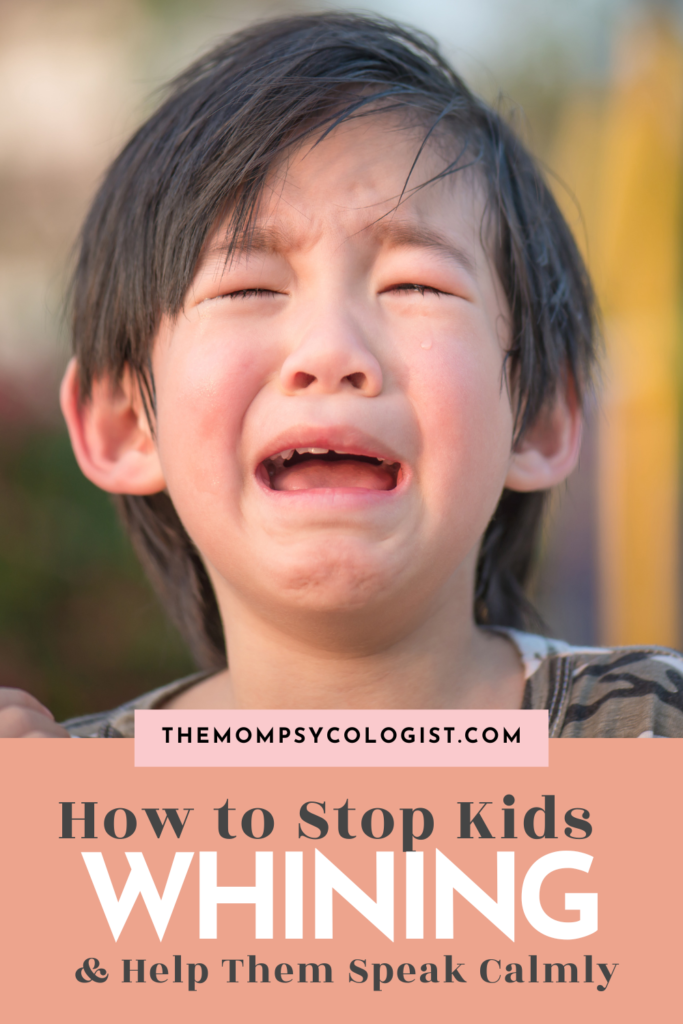watch now!
A place where I discuss all things related to toddlers and motherhood!
Subscribe to my Youtube channel
As a clinical psychologist, published author, and mother to two cheeky young children, I get it. I’ve spent YEARS researching and filtering through the noise online, so you don’t have to.
PARENTING TIPS
POTTY TRAINING
ANTIRACISM
PLAY
Blog Topics
SIBLING RIVALRY
SCREEN TIME
TANTRUMS
DISCIPLINE
Hi I'm Dr. Jazmine
How to Stop Kids Whining & Help Them Speak Calmly
topics:
One of the biggest parenting triggers is whining. Whining is a behavior that triggers alarm bells in our brain that says, “This needs to stop. This needs to go away right now.” And when this happens, it makes it hard to think clearly and step into our best parenting selves.
But before we talk about how to address whining and how to cut back on whining, we first need to talk about why it happens.

Why do kids whine?
It’s hard to shift or change a behavior if we don’t understand the root cause. Because once we understand the root cause, then we can address the behavior.
Commonly, whining is a behavior children do when they get overwhelmed with intense emotions or frustrated because they’re trying to reach a goal. They want something or need something and they’re not getting it fast enough, or they’re not getting it at all. And they’re overwhelmed with that feeling of frustration.
Another common reason children whine is that they have an unmet need. Maybe they’re feeling stressed. Maybe there’s a lot of change in unpredictability in the environment, and they need more connection or more attention. Maybe they’re overtired, and they haven’t had enough sleep or rest during the day. Maybe they’re overstimulated or under stimulated. And they don’t know another way to get that need met, so kids resort to whining.
The biggest reason children whine is that it works.
Nothing gets our attention better or quicker than when our children whine. So it’s a behavior they’ve learned has worked. Whether it’s positive or negative attention, it doesn’t matter. It’s getting the need met that matters. And so over time, children learn that whining works.
And it’s not that they’re trying to be mischievous or up to no good. It’s that we’re humans, and humans are adaptive and resilient. And so we pick up on what behavior works and what behavior doesn’t.
And finally, it’s important to remember our children’s brains are growing at an incredible rate, especially in the first 5 years. So it’s not uncommon to experience regressions like behavioral regressions, (aka, whining) or sleep regressions. Their brain is in constructive mode, and they’re learning and having new developmental leaps. And so they will regress in other skills that they’ve learned, whether it’s potty training, speech, behavior, sleep, etc.
How do I stop my child from whining?
- Regulate your emotions first.
If we get triggered by whining, we need to recognize that and have a plan for what we’re going to do in that moment to stay calm.
- Sometimes it’s helpful for some people to have mantras: “This is not an emergency. I can stay calm here. My child needs me.”
- Taking a deep breath is often helpful to calm yourself.
- Stepping away and taking a break so that we can get some perspective and regulate our emotions.
It’s going to be very hard to help our child regulate their emotions if we’re dysregulated ourselves. Dysregulated adults can’t regulate children.


I’m not asking you to reach for perfection, but I want you to work on regulating yourself before you show up in the moment with your child. I have a free resource that can help: A Simple Guide to Becoming a Calmer Parent.
- Identify your child’s unmet need.
It helps to step back and see beyond the behavior. Ask yourself:
- “What is my child trying to tell me in this moment? What is this behavior showing me?”
- “What is their possible unmet need? Are they tired? Do they need a snack? Do they need some snuggle time? Do they need me to get down on the floor and play with them?”
- “What’s going on right now? And how can I best help my child meet their unmet needs?”
Because that’s commonly what it comes down to. It’s an unmet need, or it’s a lagging skill (meaning they don’t have the skill to deal with it at the moment), or a combination of both.
They need our help and guidance to learn the skill or fulfill that need.
- Help your child learn to use their words.
This all depends on how dysregulated they are and their speaking abilities. But you can help them learn how to use their words. You can say something like:
- “I want to help you, but it’s hard for me to understand what you’re trying to tell me when you use that voice.”
- “Let’s have a redo. You can say something like `Snack, please,’” and then pause and let them say the words back.
- If they stay silent or continue to whine, you can say, “When you say ‘Snack, please,’ then I would be happy to get you a snack.” Pause and let them try to say, “Snack, please.”

If they’re still whining or complaining, that’s your cue to help them regulate their emotions a bit more because they’re not at that place to talk. Help them regulate by saying to them:
- “I hear you. It’s all right to feel frustrated. I get it. We’ll get through this moment together. Feelings come and go.”
- “I’m going to wait. I’m not going to rush to fix this situation because I know that this is a teaching moment for all of us.”
But they may become more dysregulated when you prompt them. So take a step back, regulate your emotions, and also then help them regulate their emotions.
When they finally say, “Snack, please,” pounce on that:
- “Thank you so much for using your words so I can help you. I understand you want a snack.”
Go back to reconnect, but lead with thank you.
That is a powerful teaching moment that we need to do over and over again. What we’re teaching them is it’s okay to feel frustrated or get overwhelmed. But we can use our words to get what we need because we want to shape our child’s behavior to go to this.
- Be responsive when your child does use their words.
A big part of shaping this behavior is being responsive when they use their words. If we aren’t responsive, your child is going to learn, “Words don’t work because Mom or Dad is not listening to me. They’re not taking me seriously,” and then the whining starts.

Sometimes we can’t always meet their needs in the moment, but we want to try to always recognize when they verbalize something they need and table it if we need to. This can look like:
- “Thanks for letting me know that. Gimme one second. Let me wrap up the dishes, and I’ll be right with you to get you the snack.”
We want to use our language to let them know we recognize they’re trying to tell us something or that they need something. We want to validate that even if we can’t always meet that need in the moment. That’s okay too. We still recognize it, such as:
- “Thanks for letting me know you want that. That candy bar looks so yummy. Let’s make a plan to have it later,” or “This is why we can’t have that right now. Thanks for understanding. I get it. It’s hard.”

To effectively stop your child from whining, these lessons take consistency and practice.
This is a muscle that we’re building, so it’s going to take a lot of repetition. And we have to practice with our kids and coach them through these moments. We have to put up a boundary of:
- “I need you to say this so that we can learn how we’re going to communicate with each other because whining is not how we communicate.”
- “I understand why you’re doing it. I understand you’re overwhelmed. I’m going to help you regulate your emotions so you can learn to communicate with your words and everybody can understand each other.”
It takes a lot of patience and a lot of trust in the process.
And remember, we won’t always be able to meet their wants or needs at that moment. And that’s all right. It’s okay for them to feel frustrated. That doesn’t mean we change our boundaries.
How do I teach my child not to whine?
After your child is regulated and you’re outside of the moment, that’s the time to teach.
We teach inside of the moment, but a lot of the teaching is going to come outside of the moment in everyday life.
- Use books.
One of the best ways to teach is using books, and I have book suggestions for you:
- On feelings – These books will help your child identify feelings (which is the first step in emotional regulation), and normalize feelings.

- On anger management – these books deal with the emotion of anger and frustration, helping normalize the feeling, and teach your child different tools to help them through the feeling.
- Praise and encourage the opposite behavior.
When you notice moments when your child is calm and is regulated in using their words, acknowledge their effort and appreciate it. This will also help shape the behavior.
- Make a plan for when you need to say, “No.”
Give conditional yeses when you can. What I mean by this is say they’re asking for more screen time. Instead of saying “No,” you can make a plan for the future:
- “Oh, I understand. You want more screen time. Let’s plan to have more screen time tomorrow or after dinner.”
We want to shift our “no” to making plans instead because that helps them feel a bit more secure, like they have some control, and they know what’s coming next.
If you need more help with whining, complaining, or other issues, I have a FREE workshop, How to Get Your Kids to Listen Without Yelling, where we work through discipline and setting consequences with intention and respect. I provide you with the tools you need to create a happy home where cooperation happens without the struggle.
You’ve got this,
Dr. Jazmine
Love this? Don’t lose it!
Click below and save it to your Pinterest!

Leave a Reply Cancel reply
Copyright The Mom Psychologist® 2025
grab my free script pack!
explore
work with me
information
About
Blog
YouTube
Podcast
Privacy Policy
Terms of Use
Product Disclaimer
Contact
TMP Times (Newsletter)
This was just what I needed! My 7 year old granddaughter whines when she doesn’t get her way. She will see her Mother cooking dinner and will just go get a popsicle. When her Mom tells hers she can’t have it until after dinner the whining starts. Goes through dinner. After dinner she will go get the popsicle without asking. Mom makes her put it back. But she gets it at the end and I don’t know if she uses her words. She is a 7 year old who wants to dress and act like a teenager!! I think from the TV shows she watches. I wish she would enjoy being 7!